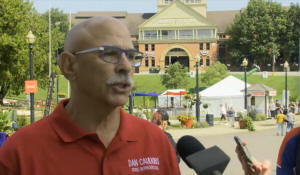Illinois Supreme Court upholds assault weapon ban, but federal test
remains
 Send a link to a friend
Send a link to a friend
[August 12, 2023]
By JERRY NOWICKI
Capitol News Illinois
jnowicki@capitolnewsillinois.com
 SPRINGFIELD – The state’s ban on high-powered weapons and high-capacity
magazines passed a state constitutional test Friday as it awaits a
potentially more daunting challenge on the federal stage. SPRINGFIELD – The state’s ban on high-powered weapons and high-capacity
magazines passed a state constitutional test Friday as it awaits a
potentially more daunting challenge on the federal stage.
In a split decision, the Democratically controlled Illinois Supreme
Court ruled 4-3 that the law characterizing dozens of firearms as
“assault weapons” and preventing their manufacture and sale in Illinois
does not constitute “special legislation.” Devices used to make guns
fire more rapidly are also banned under the law.
The law remains in effect in Illinois despite other challenges at the
federal level. Anyone who already owned one of the banned weapons prior
to the law’s Jan. 10 effective date will be able to keep it but will be
required to register it with the Illinois State Police.
Friday’s decision stems from a case brought by a group of plaintiffs led
by state Rep. Dan Caulkins, R-Decatur, who argued in legal filings that
the law arbitrarily treated certain classes of Illinois differently –
namely law enforcement officers, certain security guards, active-duty
military personnel, and people who already owned those weapons before
the law took effect – by exempting them from portions of the ban.

Caulkins’ attorneys argued that creating different classes for
“similarly situated” Illinoisans was a violation of the equal protection
clause in the state constitution.
Justice Elizabeth Rochford wrote the majority opinion rejecting that
argument.
“Plaintiffs are not similarly situated to the trained professionals,”
she wrote, with fellow Democrats Chief Justice Mary Jane Theis and
Justices P. Scott Neville and Joy V. Cunningham concurring.
Rochford also addressed the argument pertaining to those who were
“grandfathered in” to gun ownership by the law.
“To the extent plaintiffs claim they possess restricted items, they are
not treated differently from the grandfathered individuals,” she wrote.
“To the extent plaintiffs claim they do not possess restricted items,
they are dissimilar to the grandfathered individuals, who have a
reliance interest in retaining them.”
Justice Mary K. O’Brien, also a Democrat, issued her own dissent saying
that the majority should have viewed it as special legislation because a
law written more generally would have accomplished the same goal without
treating different classes differently.
“When we limit people’s rights, even the rights we might not like, we
have to do so in a way that honors the constitution,” she wrote.
The question the court answered, however, was separate from one based on
the law’s compliance with the U.S. Constitution. That decision will be
up to a three-judge panel of the 7th Circuit federal appeals court,
which heard oral arguments in the case on June 29 but has not set a
timeline for a ruling.
The measure became law with mostly Democratic support in the wake of a
mass shooting at a 2022 Independence Day parade in Highland Park that
left seven people dead and dozens more injured or traumatized.

[to top of second column]
|

State Rep. Dan Caulkins, R-Decatur,
holds a news conference at the Illinois State Fair Friday after the
state Supreme Court sided against him by ruling that the state's ban
on "assault weapons" does not run afoul of the state constitution.
(Credit: Blueroomstream.com)

Gov. JB Pritzker, who signed the bill into law in January, issued a
statement Friday calling it a “commonsense gun reform law to keep
mass-killing machines off of our streets and out of our schools, malls,
parks, and places of worship.”
“Illinoisans deserve to feel safe in every corner of our state — whether
they are attending a Fourth of July Parade or heading to work — and
that’s precisely what the Protect Illinois Communities Act
accomplishes,” Pritzker said in the statement.
One day earlier, however, Pritzker conceded that the pending federal
case – which is widely expected to end up before the U.S. Supreme Court
– will ultimately “trump whatever happens in our state courts.”
“You just don't know what's going to happen in the federal courts,”
Pritzker said at an unrelated news conference Thursday. “And as of late,
the appointees to the U.S. Supreme Court are people who, unfortunately,
want to take away the rights of parade-goers and people who live in our
neighborhoods to live safely and to not have assault weapons that are
attacking their local communities.”
Gun rights advocates like Caulkins are hopeful that the U.S. Supreme
Court – which has a 6-3 conservative majority – will take a more
expansive view of the Second Amendment. Just days before the Highland
Park shooting last summer, the U.S. Supreme Court struck down a New York
state law restricting the right to carry concealed firearms, holding
that such restrictions must be consistent with the nation’s “historical
tradition” of firearm regulations.
The majority in Friday’s opinion, however, noted Caulkins “waived” his
right to a Second Amendment challenge in state court, as “plaintiffs
explicitly and repeatedly disclaimed any such argument in the circuit
court.”
Republican Lisa Holder White wrote a separate dissenting opinion from
O’Brien’s, joined by Justice David K. Overstreet.

Holder White argued that the process through which the gun ban passed
ran afoul of the state constitution and suggested the court should
rethink its “enrolled bill doctrine” – a long-held premise granting
legislative leaders wide latitude in determining whether the legislature
followed proper procedures.
“When, as in this case, the work of the legislature directly impacts a
fundamental right, which this court has said the right to keep and bear
arms is, the people of Illinois deserve nothing less than the procedural
requirements of the constitution be followed by their elected
representatives and senators,” Holder White wrote.
Capitol News Illinois is a nonprofit, nonpartisan news
service covering state government. It is distributed to hundreds of
print and broadcast outlets statewide. It is funded primarily by the
Illinois Press Foundation and the Robert R. McCormick Foundation, along
with major contributions from the Illinois Broadcasters Foundation and
Southern Illinois Editorial Association. |